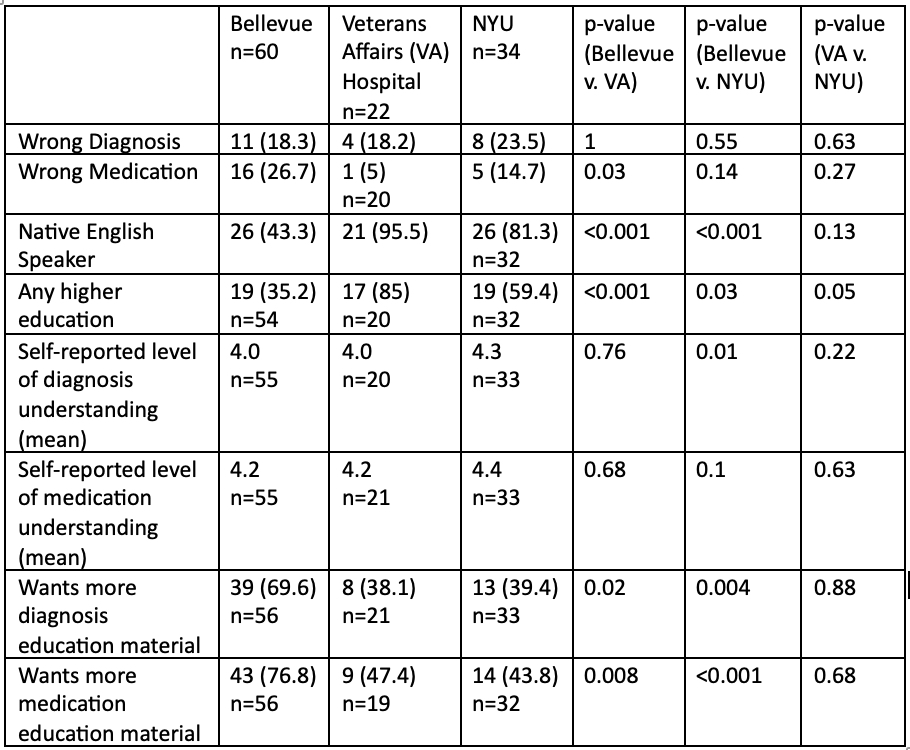Session Information
Date: Monday, November 13, 2023
Title: (1082–1099) Measures & Measurement of Healthcare Quality Poster I
Session Type: Poster Session B
Session Time: 9:00AM-11:00AM
Background/Purpose: Improving health literacy in patients with rheumatic diseases is important as many have chronic, complex diagnoses treated with high-risk medications. Poor health literacy may be due to education level, language barriers, socioeconomic status, and/or inadequate access to health education material. Many of these factors are non-modifiable, putting patients at risk for healthcare disparity. We aimed to create a quality improvement initiative to (1) better characterize those with poor health literacy and (2) improve their diagnosis and medication understanding via physician provided education material.
Methods: Patients from three distinct healthcare systems in New York City (Bellevue, NYU, the VA; Table 1) with documented rheumatologic diagnoses were administered health literacy surveys during rheumatology clinic visits from September 2022 to May 2023. A baseline survey assessed the patient’s ability to identify their diagnosis and medication from a list of options, as well as self-reported level of health literacy, desire for more printed education material, primary language, and education level. Printed patient education materials, in English or Spanish, were provided in real-time with counseling on knowledge gaps. Repeat surveys are being administered at follow-up visits to assess the effectiveness of education materials. Those completed during the study period are included for preliminary analysis.
Results: 116 patients completed the baseline survey. There were fewer native English speakers and fewer patients with higher education at Bellevue. Overall, 20% of patients incorrectly selected their diagnosis and medication from the provided list. While incorrect diagnosis selection did not vary by site, incorrect medication selection differed with 5% incorrect at the VA, 14.7% at NYU, and 27.6% at Bellevue (Table 1). Across sites, medication literacy significantly differed by education level and primary language (Table 2). 38.9% of all patients reported being unsure about holding medication during infection. On average, patients from all sites self-rated their health literacy at least a 4, on a 1-5 scale (higher=better). At baseline, 54.5% wanted more diagnosis education and 61.7% wanted more medication education; percentages were significantly higher among patients at Bellevue than other sites (Table 1). Of those who completed the repeat survey (n=27), 74.1% found the diagnosis education materials helpful and 63% found the medication education materials helpful. Those with higher education found these more helpful overall.
Conclusion: There is a discrepancy between perceived and actual health literacy in patients with rheumatic diseases, as there were notable knowledge gaps in the survey results and uncertainty about medication use during infection, despite reports of adequate understanding. This highlights the importance of providing consistent education to all patients. Medication literacy may be a particular area for improvement, as this varied by factors that engender healthcare disparity, including lower education level and primary language. The optimal way to improve patient literacy in varied settings is an important topic for future study.
To cite this abstract in AMA style:
Corbitt K, Amarnani A, Law J, Sorrento C, Leung N, Howe C, Ahmed T, Anderson M, Stream S. Identifying and Addressing Disparities in Health Literacy in Patients with Rheumatic Diseases Through Point of Care Distribution of Patient Education Materials [abstract]. Arthritis Rheumatol. 2023; 75 (suppl 9). https://acrabstracts.org/abstract/identifying-and-addressing-disparities-in-health-literacy-in-patients-with-rheumatic-diseases-through-point-of-care-distribution-of-patient-education-materials/. Accessed .« Back to ACR Convergence 2023
ACR Meeting Abstracts - https://acrabstracts.org/abstract/identifying-and-addressing-disparities-in-health-literacy-in-patients-with-rheumatic-diseases-through-point-of-care-distribution-of-patient-education-materials/


